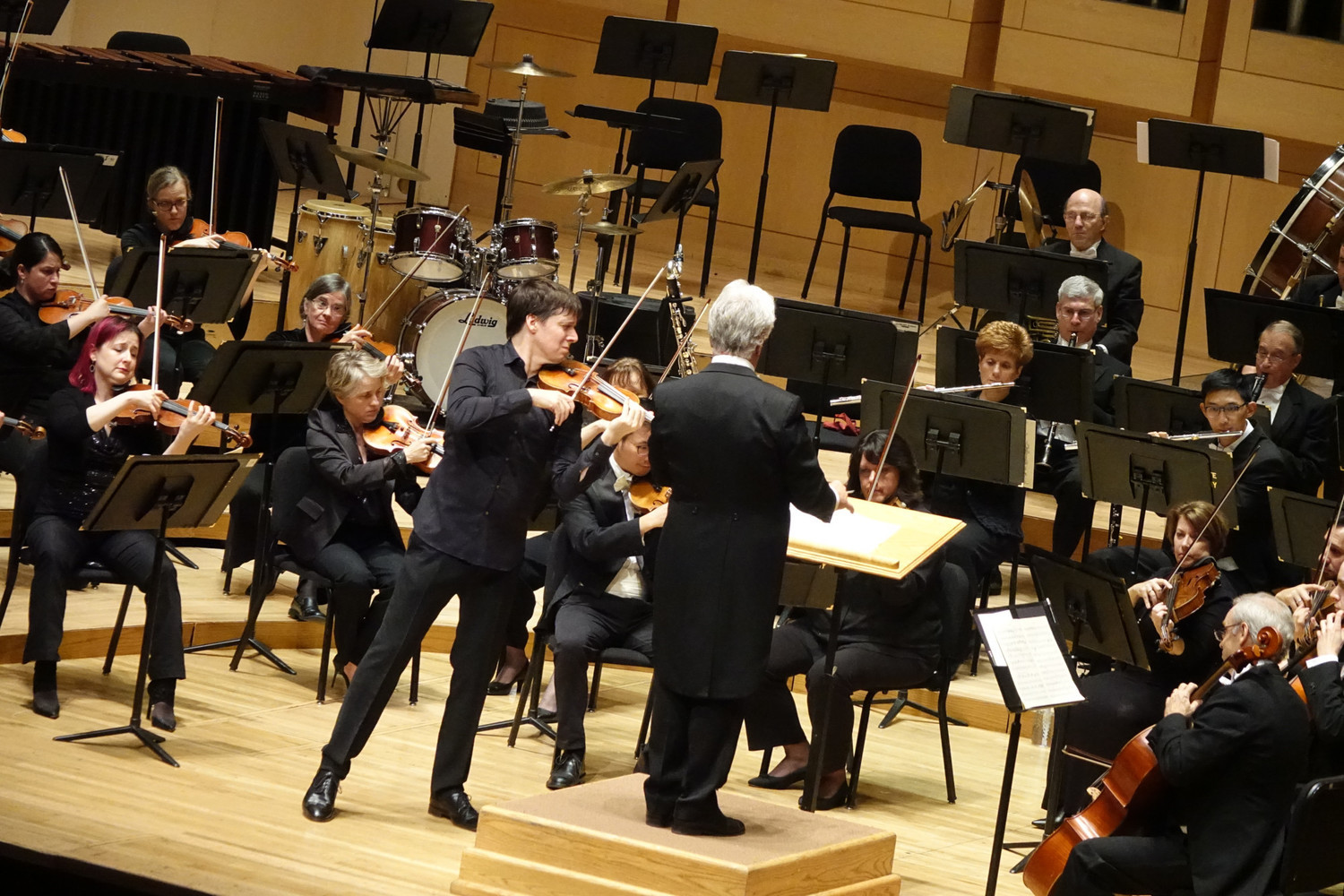Review: Symphony's OPENING NIGHT GALA Celebrates With Primal Beauty and Fire
 Although violinist Joshua Bell hadn't played with the Charlotte Symphony since the 1994-95 season, he has maintained a presence across the Carolinas, appearing at Spoleto Festival USA, the Brevard Music Festival, and Asheville's Bravo Concerts during the intervening years. Quite the favorite with promoters at Charlotte Concerts, Bell has also been welcomed to the Queen City on multiple occasions during the new millennium, a couple of times as the featured soloist and music director of London's most revered small orchestra, Academy of St. Martin in the Fields.
Although violinist Joshua Bell hadn't played with the Charlotte Symphony since the 1994-95 season, he has maintained a presence across the Carolinas, appearing at Spoleto Festival USA, the Brevard Music Festival, and Asheville's Bravo Concerts during the intervening years. Quite the favorite with promoters at Charlotte Concerts, Bell has also been welcomed to the Queen City on multiple occasions during the new millennium, a couple of times as the featured soloist and music director of London's most revered small orchestra, Academy of St. Martin in the Fields.
So it's gratifying to report that, in his first appearance on the Belk Theater stage in 11 years, the Tom Cruise of violinists isn't merely the same-old same-old Bell with more mileage on his chassis. Symphony's OPENING NIGHT GALA lived up to its headliner and its hype, for I've never seen Bell play quite this well before. Nor was the Bell performance alone in being special as Symphony launched its 2018-19 classics slate, for music director Christopher Warren-Green not only soothed subscribers' Shostakovich anxieties with a brassy overture, he slayed their fears of new music with a world premiere by Nkeiru Okoye celebrating Charlotte's 250th anniversary.
Bell remained the highlight. The higher he has ascended in the firmament over the course of his career, the louder the grumblings have become charging Bell with complacency and superficiality. I've seen why the carping has persisted when Bell played for us before, for his readings tended to be fleet and his technique squeaky clean, earmarks of his Top Gun aura. The zest and fire he brought to the Brahms Violin Concerto were unprecedented here, surpassing even the Beethoven sonata he played with Jeremy Denk at the Belk in 2007.
The years with Denk and St. Martin have brought another dimension to Bell's playing, a keener sense of his dialogue with the orchestra - and the audience. Bell and Warren-Green are both musical Londoners, so perhaps the camaraderie began there for this occasion, because there was absolutely nothing deferential about Symphony's playing in the introductory passages of the opening Allegro con troppo movement. That forceful approach prodded Bell into a response that was as fierce as it was precise, nothing careful or sleek in his double bowing - or in the dramatic attacks that followed his grace notes.
Simpatico between Bell and Symphony was even keener when we moved to the middle Adagio movement, where the lyrical interplay intensified organically as the orchestral accompaniment switched emphasis from woodwinds to strings. The sheer beauty and inevitability of the first two movements drew enthusiastic applause, outbursts that may not have pleased Bell. Instead of admonishing the crowd, as Isaac Stern famously did in his Charlotte appearance, Bell silenced them as a conductor might. With an exaggerated nod that fully involved the top half of his body, Bell gave everyone in the house the downbeat for the final Allegro giacoso movement and plunged right in. Worked like a charm. The little pause before tackling his final cadenza also proved that Bell, at 50, is his own man.
Commissioned by Symphony, Okoye's Charlotte Mecklenburg disarmed worriers as soon as it began. The luminous opening echoed Aaron Copland serenity rather than John Cage chaos, an unexpectedly heartland take on our metropolis, hinting that Okoye was taking a longer view and hearkening back to the primeval landscape before Europeans arrived on the continent. Episodes following this pristine preamble coalesced into a cavalcade of human signatures, a reel keeping us in Appalachia, snare drums bringing us to a Main Street parade. Eventually, Okoye's new work took the urban tack we had anticipated, with an emphasis on diversity. We heard a bluesy decelerating train, a cop's whistle, a tropical marimba and slithering Latin sounds mixing with the orchestral Americana.
The 250th anniversary celebration will continue later this fall at Symphony, with Warren-Green taking us to his native side of the Atlantic for an evening of English music, mostly written for British royals, mostly by Handel. You could hardly wish for a better foretaste of the celebration and the season to come than this regal, richly satisfying gala.
Reader Reviews

Videos
